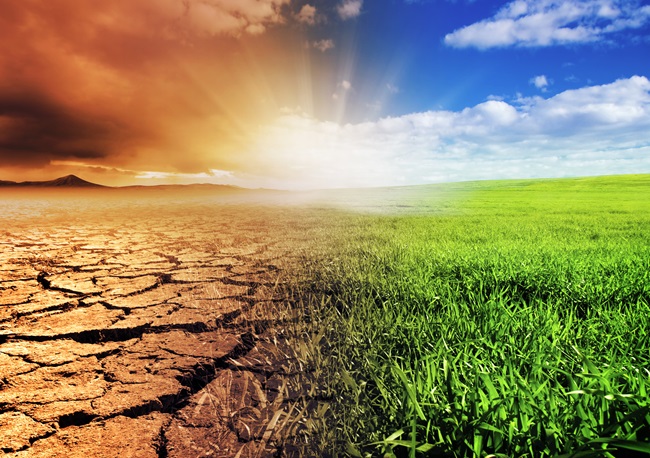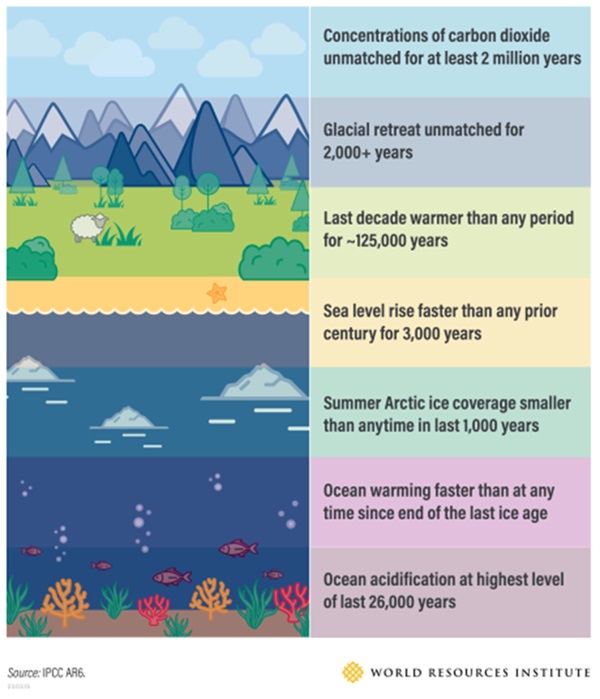Apr 13, 2025
Apr 13, 2025
by Sujata C

We are in the middle of the year 2024. Temperatures this summer have created new records all across India. Extreme weather events are normal now and taking their toll. Rising sea levels are threatening two capital cities in the Far East. A new city is being built on the eastern coast of Borneo, about 870 miles north of Jakarta at Nusantara. It will cost an estimated $35 billion and will be ready by 2045. Thailand too is finalizing its plans for a new capital city as Bangkok faces the danger of sinking into the seawater.
The Intergovernmental Panel on Climate Change (IPCC) released the final installment of its Sixth Assessment Report (AR6) in March 2023, marking an eight-year effort by the world’s leading climate scientists. This comprehensive report draws on the work of hundreds of scientists and presents the most extensive assessment of climate change to date, detailing both the devastating consequences and the actionable pathways to mitigate these effects. The key findings from the report make for some grim reading.
1. Human-Induced Global Warming
Human activities have caused global temperatures to rise by approximately 1.1°C above pre-industrial levels, leading to unprecedented changes in the Earth's climate. These changes include rising sea levels, more frequent and severe weather events, and rapid loss of sea ice. Each additional 0.5°C of warming will significantly amplify these effects, increasing the frequency and intensity of heat waves, heavy rainfall, and droughts. Moreover, higher temperatures heighten the risk of triggering climate system tipping points, such as thawing permafrost and the irreversible melting of the West Antarctic and Greenland ice sheets, which could lead to substantial sea level rises over millennia.
2. Escalating Climate Impacts
The impacts of climate change on people and ecosystems are more severe and widespread than previously anticipated. These effects will escalate rapidly with every fraction of a degree of warming. Vulnerable communities, particularly in regions like the Arctic, Central and South America, Small Island Developing States, South Asia, and sub-Saharan Africa, are already experiencing heightened impacts, such as increased mortality from extreme weather events.
3. Mitigation and Adaptation Measures
Despite the bleak outlook, the IPCC emphasizes that it is still possible to limit global temperature rise to 1.5°C, but this requires immediate and drastic action. Greenhouse gas emissions must peak before 2025, nearly halve by 2030, and reach net-zero around mid-century. Effective mitigation and adaptation strategies, such as expanding access to infrastructure and basic services, and implementing social protection programs, can support a just transition and enhance resilience to climate impacts.

4. Urgency of Immediate Action
The window for meaningful action to address climate change is rapidly closing. Immediate and comprehensive measures are required across all sectors to avoid the worst impacts of climate change. This includes transforming energy systems, reducing fossil fuel use and adopting renewable energy sources. The IPCC stresses the need for collective action from governments, the private sector, civil society and individuals.
5. Carbon Removal Necessity
Achieving the 1.5°C target necessitates not only deep decarbonization but also substantial carbon removal. This involves both natural solutions, such as afforestation and soil carbon sequestration, and emerging technologies that directly capture carbon dioxide from the atmosphere. These efforts are critical to offset emissions that are difficult to eliminate.
6. Climate Finance
Significant increases in climate finance are essential to support mitigation and adaptation efforts. Current financial flows for fossil fuels far exceed those for climate action. To meet global climate goals, investment in climate finance needs to increase three to six times by 2030. This is especially crucial for developing countries, which face the largest financial gaps and are most vulnerable to climate impacts.
7. Equity and Justice
Climate change and the measures to combat it will worsen existing inequities unless a just transition is ensured. Wealthier households contribute disproportionately to global emissions, while poorer, marginalized communities bear the brunt of climate impacts. Ensuring a fair distribution of the costs and benefits of climate action is vital. Inclusive decision-making processes can help cultivate public trust and support for transformative climate policies.
8. Rising Risks and Adaptation Needs
The need for adaptation to manage the escalating risks of climate change is critical. Measures such as enhancing social safety nets and improving access to healthcare and education can reduce vulnerability. Policymakers must prioritize adaptation strategies that are equitable and inclusive, ensuring that no one is left behind in the transition to a climate-resilient future.
The 2023 IPCC report emphasizes the urgent need for immediate, large-scale action to mitigate and adapt to climate change. The challenges are immense, but the report also offers hope, provided that effective and equitable measures are adopted to secure a livable future. However, the narrow window for action is rapidly closing, and the time to act is now.
Image (c) istock.com
01-Jun-2024
More by : Sujata C